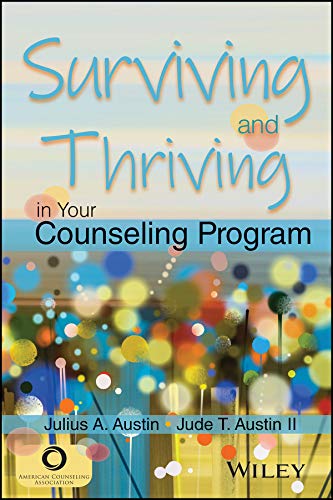by Julius A. Austin and Jude T. Austin II
This is the book I wish I had when I started graduate school.
 I thoroughly enjoyed this book. The authors of this book present the material in an authentic voice that makes the reader feel accepted and understood at whatever stage of the process they are at in the counseling program. The authors readily present their own fears and expectations when they began graduate school. They are humble and honest about things they wish they had done differently, and they embody a calm and considerate approach with a welcome addition of humor.
I thoroughly enjoyed this book. The authors of this book present the material in an authentic voice that makes the reader feel accepted and understood at whatever stage of the process they are at in the counseling program. The authors readily present their own fears and expectations when they began graduate school. They are humble and honest about things they wish they had done differently, and they embody a calm and considerate approach with a welcome addition of humor.
The authors begin with an informative section that touches on all the normal concerns and fears you may have as a student just starting a counseling program, and the book progresses through every stage of a counseling program from your first year all the way through graduation and your first job. The authors touch on core concepts in each section, common fears, and resources for success. They even provide perspective on pursuing a doctoral degree and skills for choosing where you would like to start your first job after graduation.
The book’s structure makes it flow easily from chapter to chapter, giving light to the gradual progression of course work and your own personal development and self-care. In each chapter, the authors blend in voices and stories from people currently in the profession. Sharing examples, struggles, development, and successes helps to give credibility to the process and normalize expectations and concerns.
The authors also provide a section on emotional maturity in the book. I found this section to be a welcome addition in that it defines several examples of emotional immaturity and characteristics of emotionally mature students. This section provided insight into emotional stability, emotional intelligence, and the self-awareness that is beneficial to success in a counseling program.
In addition to this, the authors also provide a section on dealing with setbacks and managing conflicts. Both sections contain valuable information to consider, and I don’t believe these topics are discussed frequently enough without judgement in other texts. Setbacks and conflicts are bound to happen in any setting. Normalizing this and looking at skills and reflections to approach these conflicts are a welcome addition to strengthening the effectiveness of this text.
Overall, I think this book is valuable, and students should consider reading this book in full when considering entering into a counseling program. This book would have also been beneficial as an assigned text during my first semester of graduate school. It is an easy and informative read that does an excellent job of reflecting on all those questions that either I was too scared to ask, only asked in my small group of equally confused classmates after class, or quite honestly, didn’t even have enough information to know I needed to ask.
This book gives amazing insight into not just the information about a counseling program, but also manages to grasp how it changes you as a person and how it changes your perspectives, your family dynamics, and your own value system. It normalizes the stress of a graduate program but also highlights the journey and the beauty of those outcomes.
Austin, J. A., & Austin, J. T., II (2020). Surviving and thriving in your counseling program. American Counseling Association.
Reviewed by: Megan Ries, NCC
